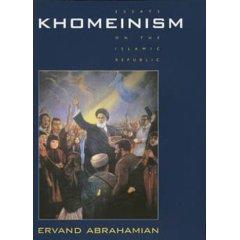| 2020ok Directory of FREE Online Books and FREE eBooks |
Free eBooks > Nonfiction > Politics > General > Khomeinism: Essays On The Islamic Republic
Khomeinism: Essays On The Islamic Republicby Ervand Abrahamian  Download Book (Respecting the intellectual property of others is utmost important to us, we make every effort to make sure we only link to legitimate sites, such as those sites owned by authors and publishers. If you have any questions about these links, please contact us.) link 1 About Book From Library Journal In this collection of essays, Abrahamian ( The Iranian Mojahedin , LJ 5/1/89) challenges the Western perception of Khomeini as a fundamentalist. He argues instead that Khomeini was a populist and that the current Iranian Islamic Republic has largely abandoned terrorism for pragmatism. Khomeini is presented as a radical cleric who broke with traditional Iranian Shi'ism to pursue social and economic reforms--an interpretation that ignores Shi'ism's revolutionary origins as a reaction of the have-nots to the Sunni Umayyad Caliphate. Abrahamian instead sees Khomeini as a champion of Iran's petite bourgeoisie and a defender of individual property rights, in this regard likening Khomeini's efforts to what he calls Latin American Populism. For another interpretation of the Islamic Republic and its goals, see Mohammad Mohaddessin's Islamic Fundamentalism ( LJ 9/15/93). A different perspective on the Islamic Republic; recommended for academic libraries with extensive holdings in Middle Eastern Studies. - Robert Andrews, Duluth P.L., Minn. Copyright 1993 Reed Business Information, Inc. Book Description "Fanatic," "dogmatic," "fundamentalist"--these are the words most often used in the West to describe the Ayatollah Khomeini. The essays in this book challenge that view, arguing that Khomeini and his Islamic movement should be seen as a form of Third World political populism--a radical but pragmatic middle-class movement that strives to enter, rather than reject, the modern age. Ervand Abrahamian, while critical of Khomeini, asks us to look directly at the Ayatollah's own works and to understand what they meant to his principal audience--his followers in Iran. Abrahamian analyzes political tracts dating back to 1943, along with Khomeini's theological writings and his many public statements in the form of speeches, interviews, proclamations and fatwas (judicial decrees). What emerges, according to Abrahamian, is a militant, sometimes contradictory, political ideology that focuses not on issues of scripture and theology but on the immediate political, social, and economic grievances of workers and the middle class. These essays reveal how the Islamic Republic has systematically manipulated history through televised "recantations," newspapers, school textbooks, and even postage stamps. All are designed to bolster the clergy's reputation as champions of the downtrodden and as defenders against foreign powers. Abrahamian also discusses the paranoia that permeates the political spectrum in Iran, contending that such deep distrust is symptomatic of populist regimes everywhere. About the Author Ervand Abrahamian is Professor of History at Baruch College at the City University of New York. He is the author of Iran Between Two Revolutions (1982) and The Iranian Mojahedin (1989). Related Free eBooks
| Related Tags |












SEND A COMMENT
PLEASE READ: All comments must be approved before appearing in the thread; time and space constraints prevent all comments from appearing. We will only approve comments that are directly related to the article, use appropriate language and are not attacking the comments of others.